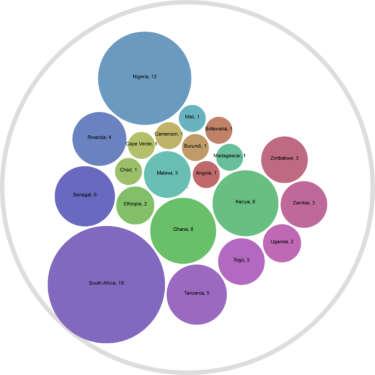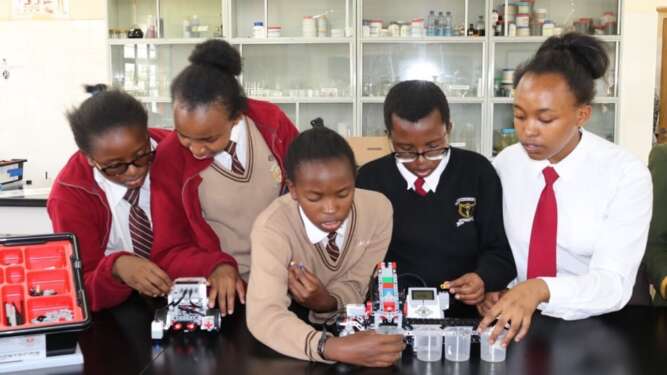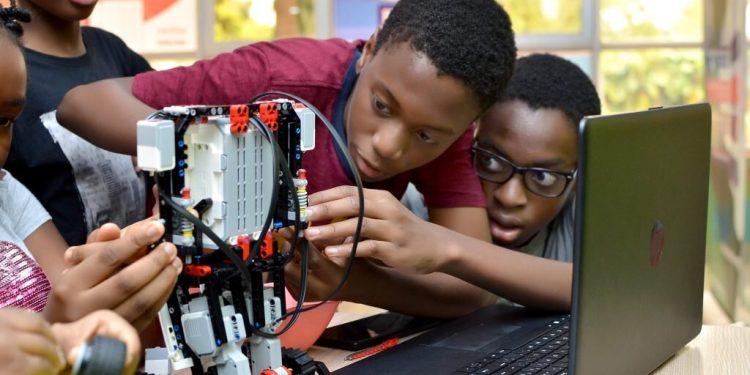For quite sometime now, there have been raging debates about the practicality of the school curriculum in some African countries.
For the longest time, African schools continued along the syllabi introduced by the colonial predecessors. There was a general outcry from African educationalists who now questioned the relevance of material that was abstract, theoretic, and not contemporary to suit the needs of today.
The world we live in has evolved through technological advancements, and it is important now more than ever, to align the educational system with developments in science, technology, engineering, and mathematics, commonly termed STEM.

Source: Afrotech
Grassroots introduction of STEM
Recently, a young Nigerian girl aged ten, Emmanuella Mayaki, made headlines after she was hired by a UK school to teach the basics of coding, HTML, and CSS to peers her age. This brilliant young girl was selected for her extraordinary IT skill and knowledge. This highlights how the early introduction of STEM can make a positive impact on the African narrative. Studies have shown that the early introduction of STEM (as early as four years old) has an impact on a child’s IQ going forward. This is because young minds are still imaginative and are receptive to new concepts and ideas. As children grow older, their imagination becomes convergent, which then lowers their IQ as they conform to an educational system that encourages regurgitation more than imaginative thinking.
The importance of STEM in modern society
Our world has changed, and we need to adapt accordingly. Science is all around us and technology is expanding faster than we could have imagined. In the past few decades, STEM occupations have risen, with STEM degree holders earning higher incomes even if they are not employed in STEM-related professions. With a lot of professions becoming redundant, it is crucial to make informed decisions to stay ahead of the game.
Some of the world’s leading economies have significantly invested in STEM, and this has had a direct impact on the sustainable growth and stability of their economies. Countries that are lagging in the STEM revolution end up being high importers of new technologies, with the export countries being the dominant players on the economic front.
STEM education creates active thinkers and not passive observers. The early introduction of such an education system will encourage innovative thinkers that will be relevant in the future. As STEM takes a hands-on and minds-on learning approach, children find it easier to grasp concepts through practical participation as compared to the theoretic approach to learning.

Practical solutions to adopting STEM
In any project, the foundation is key. Just as builders ensure a strong and steady foundation for the building under construction, so is the importance of early adoption of STEM education for young minds. Technological innovation is largely driven by the young generation. Africa enjoys a young population, with more than 60% being under the age of 25. It is estimated that by 2035, the working population in Sub-Saharan Africa will surpass that of the rest of the world. With most of the world having an older population, Africa has a competitive advantage for economic growth and development through young, creative, and innovative minds.
To engage young minds in STEM, it needs to be integrated into the education system in fun ways. For example, games and applications can be designed to be enjoyable and interactive, whilst honing skills in scientific experiments and inventive thinking. Pre-schools and junior schools should therefore be provided with resources that support STEM learning.
Although the school plays a crucial role in advancing STEM, parents should also be actively involved in nurturing scientific curiosity in young minds. This can be by assisting in researching scientific inquiries from the young child through the day-to-day activities or even enrolling your child in extra-curricular activities that support STEM.
In universities and technical colleges, investment in departments that focus on scientific research and development will go a long way in helping the continent realize its STEM goals. If engineering students are allowed to design and create practical solutions to everyday needs, Africa will soon be a leader in tech and development. Annually, many motor vehicles are imported into Africa. Instead of buying cars from overseas markets, these students can design and make an engine for Africa, by Africans.
One of the major challenges currently faced by most African countries is that of the brain drain phenomenon. STEM careers pay more in developed countries than in Africa. This has resulted in the continent losing many capable STEM minds to better economies. If Africa implements policies to retain its STEM-educated population, this will likely change the continent’s narrative through creative and disruptive tech achievements.

Notable wins
It is praiseworthy to note that various African governments are investing in STEM education through awarding scholarships to students pursuing STEM careers. As financial barriers are lifted through this governmental support, more students will enroll in STEM programs at higher learning institutes, thereby establishing a generation of innovative thinkers and future science leaders.
In line with vision 2030, the African Union has been encouraging member states to invest at least 1% of its GDP on research and development associated with STEM. Should countries adopt this policy, Africa is sure to make great strides in innovation and tech.
Golab Goes Africa is an initiative that encourages scientific engagement and experimentation through giving access to labs, learning applications, and spaces to teachers and students. This project has been set to pilot in a few countries, with the hope of establishment in other countries on the continent.
Conclusion
Africa is renowned for its abundance of natural resources. Unfortunately, most leave the continent as raw materials as very little, if any, of the processing is done on the continent. When the processed raw materials are then brought back onto the continent, the price of the processed goods is probably ten times the amount the raw material was sold for.
Looking at the energy sector, lithium-ion batteries have become heavily relied on worldwide. In the world, Zimbabwe has been ranked 5th among the top lithium producers. With the high demand for lithium, imagine the possibilities for economic growth should the lithium be mined and processed in the country, and then sold to the rest of the world as finished products. All this can be made possible with adequate investment in and successful implementation of STEM education for the young generation, the future leaders of Africa.
Read also: Future of Work: Africa should rethink its education, skills











